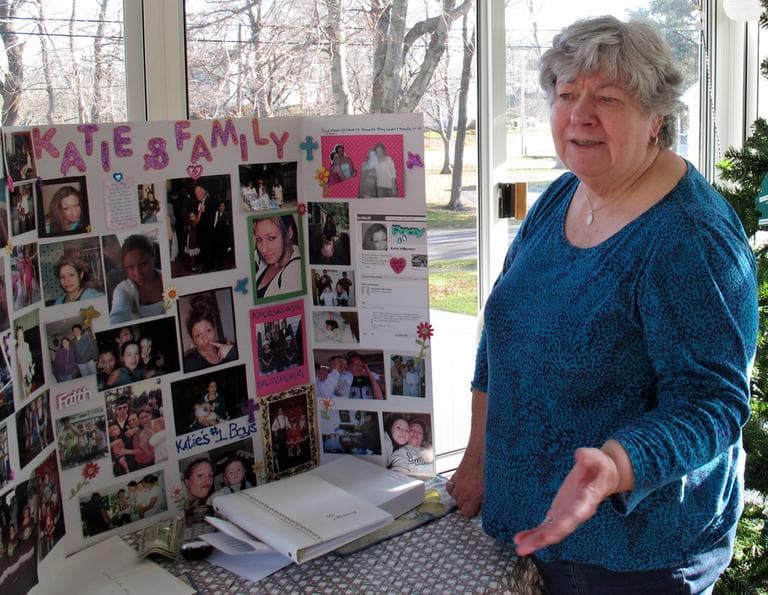Advertisement
Opioid Overdoses In Eastern Mass. Highest In Nation
ResumeEastern Massachusetts had the highest rate of emergency room visits involving illicit drugs of any metropolitan region in the United States in 2011, according to a recent report (PDF) by the Massachusetts Health Council. The report also showed that heroin, potent and easily accessible, is a big part of the problem.
Heroin Addiction
Twenty-two-year-old Katie Johansen was smart, attractive and loved socializing, says her mother Mary Johansen. And she was addicted to heroin.

"Nobody could forget Katie. Even the things that she did wrong would make you laugh," Mary said. "That drug just took everything that she could be positively out of her."
Mary, who’s originally from England, remembers how she fought Katie over her addiction. She threw her out of the house many times and made her stay overnight in jail when she called asking to be bailed out. She went to court and had Katie committed to a drug treatment program for 30 days and supported Katie when she went to detox.
But Katie, who dropped out of high school and worked part-time jobs, always came back home, promising to quit heroin. The night before she died two weeks ago, Katie told her mother she was ready to start taking a medication: a shot that would make her violently ill if she used heroin.
"She said to me, 'Mom, I love you,' " Mary recalled. "We talked every day about giving up this thing."
But Mary recalls being skeptical. "I said, 'Oh yeah, sure Katie. You know what, actions speak louder than words.' "
On her way upstairs Mary remembers Katie saying, "I’m going to show you, Mom."
Mary thinks Katie was high at the time and that she went upstairs to her room to shoot more heroin.
"That’s how they found her the next morning. She fell backwards with the needle still in her arm," Mary said.
Eastern Mass. Particularly Hard Hit
Katie Johansen’s death is surprisingly common in parts of Massachusetts. On the South Shore, someone dies of an overdose every eight days.
Last year was the first year the nonprofit Massachusetts Health Council tracked opiate overdoses in the region as compared to other parts of the country.
"We are actually the top state in the country for overdoses, for opiate overdoses," said Susan Servais, executive director of the Massachusetts Health Council.
The problem is most acute in Worcester, where lifetime use of heroin is twice the state average. The report doesn't look at why, but those in the substance abuse field say the problem stems in part from doctors over-prescribing opiates for pain, often for simple procedures. The patients themselves can become addicted or the pills can be stolen from medicine cabinets and passed around. When someone becomes addicted to pain pills, heroin can be an easy jump because it's cheaper.
"The epidemic continues to grow because the prescriptions are so available out there," said Joanne Peterson, who runs the network of support groups called Learn To Cope.
"There are so many factors," Peterson said. "There is over-prescribing, there is diversion. And there’s more and more opiate pills being flooded out into the market by pharmaceutical companies that continue to put them out there."
Peterson also blames a medical culture that believes no one should feel pain.
Legislators Work To Address The Problem
Last summer, lawmakers passed a law mandating that all doctors prescribing highly addictive painkillers must check a statewide database to see if their patients have been prescribed similar medications.
Sen. John Keenan, D-Quincy, chair of the Joint Committee on Mental Health and Substance Abuse, says the new requirement will eventually decrease the number of prescription painkillers available, which could slow demand for heroin.
"One of the goals of the legislation is to prevent people from going down the path of dependence and addiction," Keenan said. "So that if I am legitimately hurt and I am prescribed prescription painkillers, that I won’t be able to doctor shop or that the physician I’m dealing with will have a better understanding of my prescription history."
The law also has a Good Samaritan provision to encourage more people to call for help without fear or prosecution when someone overdoses. In addition, the state says there's hope in the drug naloxone, which immediately reverses the effects of an overdose. In the last five years, 1,700 people have had their overdoses reversed. It can save lives, but it doesn't stop addiction.
People are still dying from heroin and Mary Johansen wants more people to know about the problem.
"I said to the police officer, 'You know, if I had my way I’d ask the Patriot Ledger to put on the front page headline: Katie Johansen died today, another victim of heroin,' " Mary said.
This program aired on December 5, 2012.